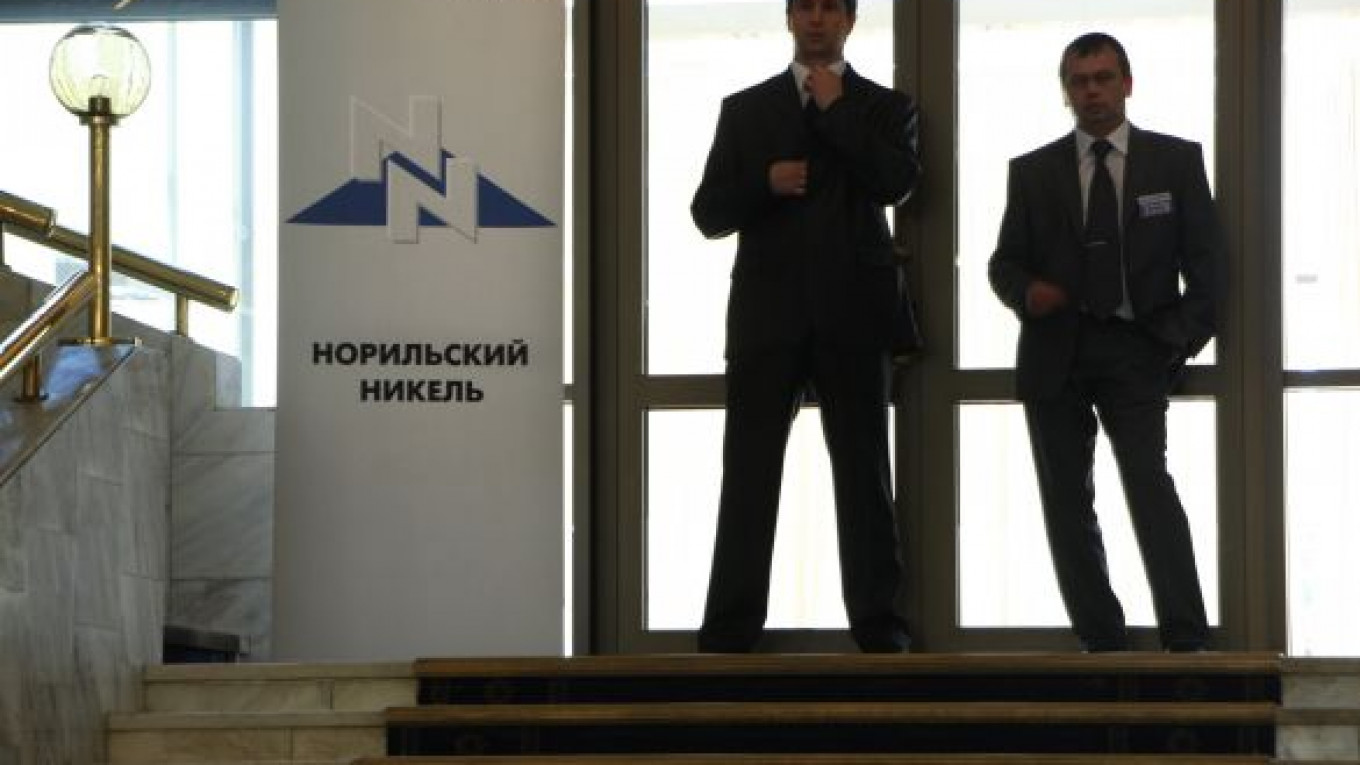The Kremlin's oft-rumored dream of creating a state mining giant is likely to remain a fantasy as budget woes make buying into Norilsk Nickel difficult despite pressure from its owners to intervene in their latest row.
Industry sources said one of the quarreling tycoons who owns a chunk of Norilsk wants state intervention, but analysts and investors expect Russia to avoid such a move given its new focus on a $29 billion asset sale plan to fill budget holes.
"It is not a good moment for the state to buy into new assets," said Ivan Mazalov, who helps manage $4 billion of Russian stocks at Prosperity Capital Management, including shares in Norilsk.
"They need to plug budget holes, and generally the time has come for the government to sell rather than buy. I hope they understand the state cannot be an efficient manager," he said.
Russia is unlikely to balance its budget deficit until 2015, and Prime Minister Vladimir Putin said last month that the country might not be able to reduce the deficit to less than 5 percent — or $80 billion — this year. Rumors about the state buying Norilsk — the world's top nickel and palladium producer with a market capitalization of $32 billion — have hit the market regularly over the past decade as the Kremlin tightened control over oil and gas, where Russia is also the world's top producer.
When Oleg Deripaska's United Company RusAl bought 25 percent in Norilsk in 2008, analysts said it was a precursor for a full takeover by the billionaire industrialist, seen as one of the most loyal to the Kremlin.
But instead the firm became a battlefield between Deripaska and another 25 percent stake owner, Vladimir Potanin, as both repeatedly argued about management tactics and strategy while the state silently watched.
The Kremlin stepped in to save both tycoons during the height of the crisis, refinancing their heavy debts and taking shares in Norilsk as collateral.
That again resurrected rumors about the Kremlin becoming an ultimate owner of Norilsk, though the credits have now been refinanced.
"We are not considering such an option [buying into Norilsk]," Vneshekonombank head Vladimir Dmitriyev said last month after VEB agreed to a new refinancing scheme of RusAl's debts.
The long-running conflict flared up again at the June 28 annual general meeting, when RusAl saw its board representation reduced to three seats from four, after which it accused Norilsk of voting with its treasury stock to shift the balance.
After the vote, reports began to surface that RusAl wanted the state to acquire the 8.5 percent stake held by Norilsk management.
Analysts at UralSib said a third party could step in as a buyer as the state remains on the sidelines.
"We believe that the ideal solution to the conflict for the Kremlin would be a buyout of one of the core shareholders' Norilsk stakes by a third party, but not by the state or a state-owned company or bank," the bank's analysts wrote.
Stakes in the battle are high for minority shareholders, who hold about 40 percent of Norilsk, as the two tycoons have sharply divergent plans over dividend payments.
In May, RusAl asked Norilsk's board to pay out 110 percent of 2009 profits as a dividend, though it rejected the request.
A Moscow-based analyst said this indicates that if RusAl regains the upper hand on the board, dividends could rise.
"With Norilsk's attractive margins and strong cash flows, there is certainly room for shareholders to argue that Norilsk should pay more of the cash it generates in the form of a dividend, unless the company can show that other strategic options, such as acquisitions or organic expansion, offer better risk-adjusted return than its shareholders can find elsewhere," the analyst said.
A Message from The Moscow Times:
Dear readers,
We are facing unprecedented challenges. Russia's Prosecutor General's Office has designated The Moscow Times as an "undesirable" organization, criminalizing our work and putting our staff at risk of prosecution. This follows our earlier unjust labeling as a "foreign agent."
These actions are direct attempts to silence independent journalism in Russia. The authorities claim our work "discredits the decisions of the Russian leadership." We see things differently: we strive to provide accurate, unbiased reporting on Russia.
We, the journalists of The Moscow Times, refuse to be silenced. But to continue our work, we need your help.
Your support, no matter how small, makes a world of difference. If you can, please support us monthly starting from just $2. It's quick to set up, and every contribution makes a significant impact.
By supporting The Moscow Times, you're defending open, independent journalism in the face of repression. Thank you for standing with us.
Remind me later.






